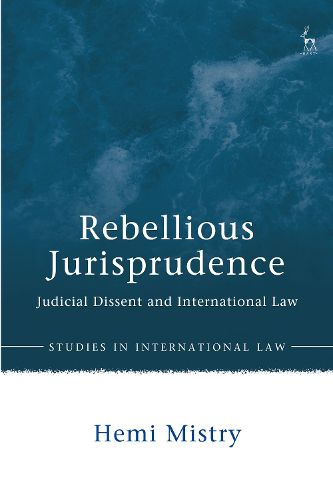Readings Newsletter
Become a Readings Member to make your shopping experience even easier.
Sign in or sign up for free!
You’re not far away from qualifying for FREE standard shipping within Australia
You’ve qualified for FREE standard shipping within Australia
The cart is loading…






Rebellious Jurisprudence is the first attempt to construct a theory of judicial dissent as a matter of general international law. Although dissenting and separate opinions are typically associated with the common law tradition, the right of judges to issue such opinions has been recognised and reproduced across most international tribunals. Despite this, until now no attempt has been made to theorise the institutionalisation of judicial dissent in international law and its implications for how international tribunals discharge their functions. This study offers a theory of judicial dissent that addresses its ubiquity in international law, notwithstanding the often-fundamental disagreement between the principal legal cultures as to its effects. Rebellious Jurisprudence explores how insights from social anthropology - specifically ritual theory - supplement conventional accounts of judicial dissent. Whereas existing literature focuses upon ‘revolutionary’ or ‘radical’ dissent, this study expands our field of focus to sharpen our understanding of the ‘everyday’ dissent: the (rebellious) ‘institutional dissent’. By revealing how judicial dissent operates, and to what ends, Rebellious Jurisprudence is essential reading for those who regularly engage with judicial dissent by international judges - whether judges, practitioners, scholars or students - who seek to deepen their understanding of, and in turn enhance the accuracy and effectiveness by which they engage with, this burgeoning body of jurisprudential activity.
$9.00 standard shipping within Australia
FREE standard shipping within Australia for orders over $100.00
Express & International shipping calculated at checkout
Rebellious Jurisprudence is the first attempt to construct a theory of judicial dissent as a matter of general international law. Although dissenting and separate opinions are typically associated with the common law tradition, the right of judges to issue such opinions has been recognised and reproduced across most international tribunals. Despite this, until now no attempt has been made to theorise the institutionalisation of judicial dissent in international law and its implications for how international tribunals discharge their functions. This study offers a theory of judicial dissent that addresses its ubiquity in international law, notwithstanding the often-fundamental disagreement between the principal legal cultures as to its effects. Rebellious Jurisprudence explores how insights from social anthropology - specifically ritual theory - supplement conventional accounts of judicial dissent. Whereas existing literature focuses upon ‘revolutionary’ or ‘radical’ dissent, this study expands our field of focus to sharpen our understanding of the ‘everyday’ dissent: the (rebellious) ‘institutional dissent’. By revealing how judicial dissent operates, and to what ends, Rebellious Jurisprudence is essential reading for those who regularly engage with judicial dissent by international judges - whether judges, practitioners, scholars or students - who seek to deepen their understanding of, and in turn enhance the accuracy and effectiveness by which they engage with, this burgeoning body of jurisprudential activity.